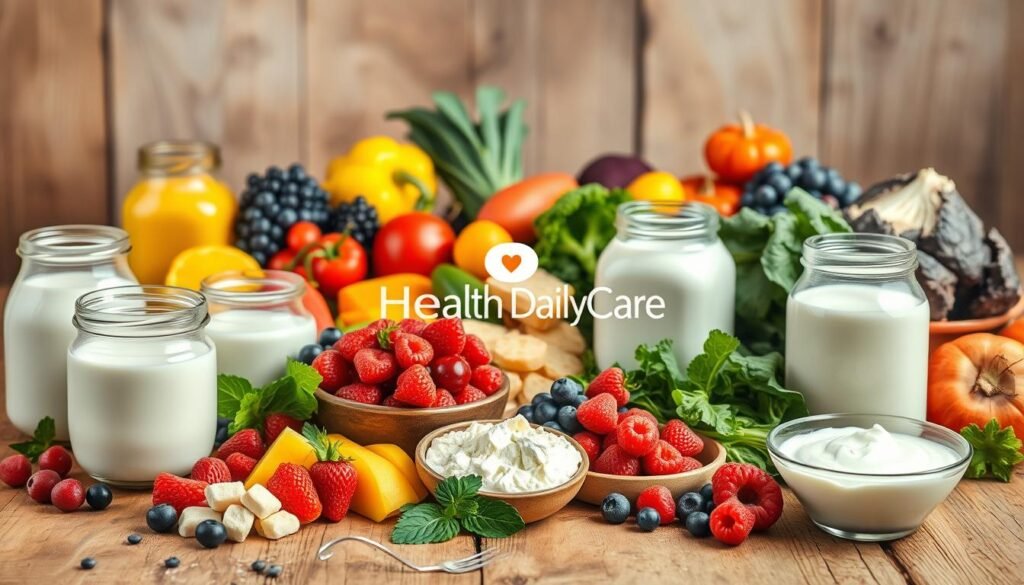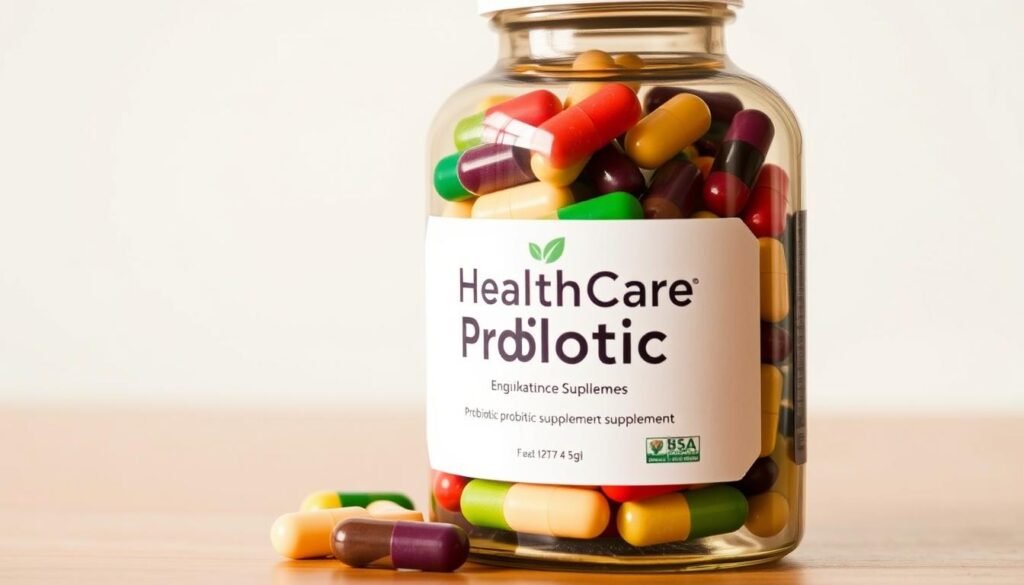We have trillions of microorganisms living with us, helping our bodies function well. They are key for a balanced diet and clean eating. Beneficial microbes, like probiotics, help control harmful ones, keeping us healthy.
Probiotics are live microorganisms that help balance our gut flora. They can be found in supplements and fermented foods. Adding probiotics to our diet boosts our well-being and immune system, important for clean eating.
Exploring probiotics shows their role in gut health. They help us stay well by balancing our diet and lifestyle. By choosing wisely, we support our gut health and keep a healthy balance of microorganisms.
Key Takeaways
- Probiotics are live microorganisms that enhance gut flora balance when consumed in adequate amounts.
- They can be found in various forms, including dietary supplements and fermented foods.
- Probiotics play a crucial role in controlling the potentially harmful types of microorganisms.
- Incorporating probiotics into our daily diet can promote overall well-being and support our immune system.
- A balanced diet that includes probiotics and prebiotics is essential for maintaining a healthy gut and overall wellness.
- Gradual incorporation of probiotics and prebiotics into our diet is recommended to monitor individual responses.
Understanding the Gut Microbiome and Its Importance
The gut microbiome is home to trillions of microorganisms in our gut. They are key to our digestion, immunity, and even our mental health. A balanced mix of bacteria in our gut is vital for staying healthy.
Nutrition tips and healthy recipes are crucial for a healthy gut. Eating foods high in fiber, like fruits and veggies, helps good bacteria grow. Meal planning ensures we get the nutrients our gut needs. Making smart food choices supports our gut and overall health.
A healthy gut microbiome boosts digestion, immunity, and mental clarity. Understanding its importance and supporting it is key to our health. By following nutrition tips, healthy recipes, and meal planning, we can make a positive impact on our gut health.
| Food | Fiber Content | Beneficial Bacteria |
|---|---|---|
| Fruits | High | Lactobacillus, Bifidobacterium |
| Vegetables | High | Lactobacillus, Bifidobacterium |
| Whole Grains | High | Lactobacillus, Bifidobacterium |
The Science Behind Probiotics
Exploring probiotics means diving into the science of these helpful microbes. They help our digestion and immunity by filling our gut with good bacteria. This pushes out bad bacteria and keeps our gut healthy. This healthiness can also affect how we eat mindfully.
Probiotics are key in following dietary guidelines for a healthy gut. Eating probiotics, found in fermented foods or supplements, supports our gut. This can lead to better digestion, stronger immunity, and even mental health perks.
Some major benefits of probiotics include:
- They help with digestion and reduce irritable bowel syndrome symptoms.
- They boost our immunity and lower infection risks.
- They make vitamins and hormones that help our health.

Adding probiotics to our daily life is a big step for our health. They help us eat mindfully and follow dietary guidelines. Probiotics are crucial for a healthy gut and balanced digestion.
| Probiotic Strain | Benefits |
|---|---|
| Lactobacillus | Supports digestion, boosts immunity |
| Bifidobacterium | Produces vitamins, supports mental health |
Different Types of Probiotics and Their Functions
Probiotics are key for a healthy gut, but did you know there are many types? Each has its own benefits. Choosing the right probiotic supplement is crucial. A balanced diet rich in nutrient-dense foods supports good gut bacteria.
Lactobacillus, including L. acidophilus and L. rhamnosus, is often recommended. These help with digestion and boost the immune system. Streptococcus thermophilus and Bacillus coagulans are also important.
- Look for a supplement with multiple strains
- Choose a reputable manufacturer
- Consider the benefits of each strain
| Probiotic Strain | Potential Benefits |
|---|---|
| L. acidophilus | Supports digestion and immune function |
| B. animalis | Supports digestion and immune function |
| S. thermophilus | Supports digestion and immune function |
Adding probiotics to our diet, through supplements or nutrient-dense foods, is beneficial. It helps grow good gut bacteria. This leads to a balanced diet and better health.
Natural Sources of Probiotics in Your Diet
We can add probiotics to our diet with natural sources. This supports clean eating and healthy recipes. Foods like yogurt, kefir, sauerkraut, and kimchi are great. They are full of good bacteria that help our gut health.
Here are some natural sources of probiotics to add to your diet:
- Yogurt: high in lactic acid bacteria and bifidobacteria
- Kefir: made from cow’s or goat’s milk, with a diverse array of probiotics
- Sauerkraut: high in fiber, vitamins C and K, iron, and potassium
- Kimchi: rich in vitamins and includes the bacteria Lactobacillus kimchii
Adding these probiotic-rich foods to your diet helps your gut and overall health. Choose unpasteurized and unprocessed foods for live cultures. With a bit of creativity, you can make healthy recipes that boost clean eating habits.

| Food | Probiotic Content | Health Benefits |
|---|---|---|
| Yogurt | Lactic acid bacteria and bifidobacteria | Improved bone, heart, and gastrointestinal health |
| Kefir | Diverse array of probiotics | Supports gut health and immune system |
| Sauerkraut | Live cultures of beneficial bacteria | High in fiber, vitamins C and K, iron, and potassium |
Fermented Foods and Nutrition & Healthy Eating
Fermented foods have been around for almost 10,000 years. They are key in many traditional diets. Adding them to our meal planning can boost gut health and overall health.
Exploring fermented foods around the world is rewarding. Foods like sauerkraut and kimchi are full of probiotics. They help our immunity, reduce inflammation, and keep our bowels regular.
Traditional Fermented Foods
Yogurt and kefir are made through lacto-fermentation. This process creates a home for good bacteria.
Modern Probiotic-Enhanced Products
Today, we have probiotic-infused yogurt and kefir. These products make it easy to add probiotics to our diet.
Making Fermented Foods at Home
Creating fermented foods at home is fun and rewarding. With patience and practice, we can make sauerkraut and kimchi. They are great for our meal planning and mindful eating journey.
| Fermented Food | Probiotic Content | Health Benefits |
|---|---|---|
| Sauerkraut | High | Supports gut health, boosts immunity |
| Kimchi | High | Supports gut health, reduces inflammation |
| Yogurt | Moderate | Supports gut health, aids digestion |
Health Benefits of Regular Probiotic Consumption
Exploring probiotics reveals their big impact on our health. Adding probiotics to our nutrition & healthy eating routines brings many benefits. These include less antibiotic diarrhea and better irritable bowel syndrome symptoms.
Regular probiotic use offers several health perks:
- Improved digestion and reduced symptoms of irritable bowel syndrome
- Enhanced immune function and reduced inflammation
- Support for mental health and reduced symptoms of anxiety and depression
- Potential reduction in eczema severity and improved skin health
By adding probiotics to our daily lives, we support our health. Whether through food or supplements, probiotics’ benefits are clear. Remember, a balanced diet is key to our health as we delve into probiotics.

Potential Risks and Side Effects
Adding probiotics to our diet can bring many health benefits. But, it’s important to know the possible risks and side effects. As we focus on clean eating and healthy recipes, we should also think about the downsides of probiotic use.
Research shows that side effects from probiotics are rare. Most healthy adults can safely eat foods with prebiotics and probiotics. But, some people need to be careful. For example, those with weak immune systems or health issues should avoid probiotics or get advice from a doctor.
Common Side Effects
Common side effects of probiotic supplements include bloating, gas, and stomach cramps. These are usually mild and short-lived. It’s important to talk to a healthcare provider before starting probiotic supplements, especially if you have health issues or are on medication.
Who Should Avoid Probiotics
People with weak immune systems should avoid probiotics or take them with a doctor’s advice. Also, those with health conditions like irritable bowel syndrome should be careful when using probiotics.
When to Consult a Healthcare Provider
If you have severe side effects or concerns about probiotics, see a healthcare provider. They can guide you on the best steps for your health and help you make informed choices.
Choosing the Right Probiotic Supplement
When picking a probiotic supplement, we focus on the strains and their benefits. We look for products with Lactobacillus and Bifidobacterium strains. It’s also important to choose a well-known brand. The American Gastroenterological Association suggests S. boulardii, Lactobacillus, and Bifidobacterium species.
For mindful eating and sticking to dietary guidelines, we check the CFU count and expiration date. A good probiotic should have at least 1 billion CFU per dose. We also make sure the probiotics are still viable, as they can lose potency over time.
Here are some key factors to consider when choosing a probiotic supplement:
- Specific strains: Lactobacillus, Bifidobacterium, Bacillus, or Saccharomyces boulardii
- CFU count: at least 1 billion per dose
- Expiration date: ensure the product is potent and effective

By looking at these factors and following dietary guidelines, we can choose wisely. This helps support our health through mindful eating habits.
| Probiotic Strain | CFU Count | Expiration Date |
|---|---|---|
| Lactobacillus | 1 billion | 6 months |
| Bifidobacterium | 2 billion | 12 months |
How to Incorporate Probiotics Into Your Daily Routine
To keep your gut healthy, add probiotics to your daily life. Eat foods like fermented veggies, yogurt, and kefir. These are full of probiotics. A diet rich in these foods helps your gut grow good bacteria.
Here are some ways to add probiotics to your day:
- Try adding fermented foods like sauerkraut or kimchi to your meals.
- Consider taking probiotic supplements, in capsule or powder form.
- Drink probiotic-rich drinks like kefir or kombucha.
Meal Planning with Probiotics
Meal planning is key to adding probiotics to your routine. Plan your meals to include a variety of nutrient-rich foods. This helps your gut grow good bacteria and stay healthy.
Supporting Your Gut Microbiome Beyond Probiotics
Probiotics are key for gut health, but they’re not everything. Eating a balanced diet with fruits, veggies, whole grains, and lean proteins helps too. Mindful eating is also important. It helps us listen to our hunger and fullness, reducing stress and supporting a healthy gut.
Meal planning is another big help for gut health. By planning meals, we make sure we eat a variety of whole foods. Foods like asparagus, bananas, and onions are great for this. Here are some meal planning tips:
- Incorporate a variety of colorful fruits and vegetables into your meals
- Choose whole grains over refined grains
- Include lean protein sources like poultry, fish, and legumes
By combining these lifestyle changes with probiotics or fermented foods, we can support our health fully.
Here’s a quick summary of the main points:
| Factor | Description |
|---|---|
| Diet | A balanced diet that includes plenty of fruits, vegetables, whole grains, and lean protein |
| Mindful Eating | Paying attention to our body’s hunger and fullness cues, reducing stress and promoting a healthy gut microbiome |
| Meal Planning | Planning meals in advance to ensure a variety of whole foods, including prebiotic-rich foods |
Conclusion: Making Probiotics Work for Your Health
Probiotics are key to a healthy gut and overall well-being. They help us maintain a balanced gut microbiome. We can get them from clean eating or supplements.
Probiotics boost our immune system and reduce inflammation. They also improve digestion and mental health. This shows how probiotics can greatly benefit our health.
Let’s make probiotics a part of our lives. Choose good sources, follow the guidelines, and eat well. This will help our gut and make us feel better. Here’s to a healthier, happier you!

